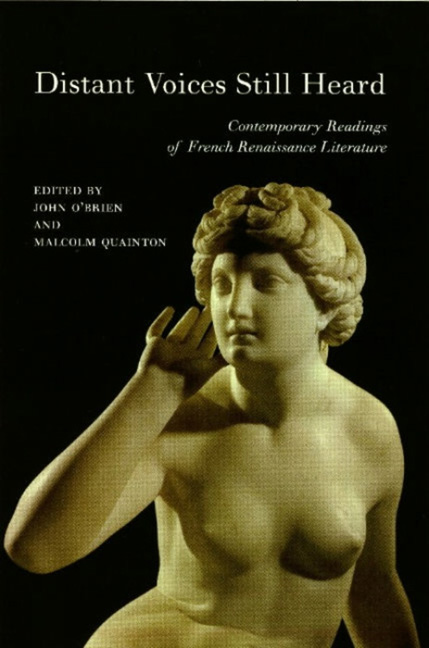Book contents
- Frontmatter
- Contents
- Editors’ Foreword
- Introduction: The Time of Theory
- 1 The Highs and Lows of Structuralist Reading: Rabelais, Pantagruel, chapters 10—13
- 2 Rabelais’ Strength and the Pitfalls of Methodology: Tiers Livre, chapters 7–18
- 3 ‘Blond chef, grande conqueste’: Feminist Theories of the Gaze, the blason anatomique and Louise Labé's Sonnet 6
- 4 Louise Labé's Feminist Poetics
- 5 Reading and Writing in the Tenth Story of the Heptaméron
- 6 Fetishism and Storytelling in Nouvelle 57 of Marguerite de Navarre's Heptaméron
- 7 Creative Choreography: Intertextual Dancing in Ronsard's Sonnets pour Hélène: II, 30
- 8 An Overshadowed Valediction: Ronsard's Dedicatory Epistle to Villeroy
- 9 ‘De l'amitié’ (Essais 1.28): ‘Luy’ and ‘Moy’
- 10 Montaigne's Death Sentences: Narrative and Subjectivity in ‘De la diversion’ (Essais 3.4)
- Select Bibliography
- Index
1 - The Highs and Lows of Structuralist Reading: Rabelais, Pantagruel, chapters 10—13
- Frontmatter
- Contents
- Editors’ Foreword
- Introduction: The Time of Theory
- 1 The Highs and Lows of Structuralist Reading: Rabelais, Pantagruel, chapters 10—13
- 2 Rabelais’ Strength and the Pitfalls of Methodology: Tiers Livre, chapters 7–18
- 3 ‘Blond chef, grande conqueste’: Feminist Theories of the Gaze, the blason anatomique and Louise Labé's Sonnet 6
- 4 Louise Labé's Feminist Poetics
- 5 Reading and Writing in the Tenth Story of the Heptaméron
- 6 Fetishism and Storytelling in Nouvelle 57 of Marguerite de Navarre's Heptaméron
- 7 Creative Choreography: Intertextual Dancing in Ronsard's Sonnets pour Hélène: II, 30
- 8 An Overshadowed Valediction: Ronsard's Dedicatory Epistle to Villeroy
- 9 ‘De l'amitié’ (Essais 1.28): ‘Luy’ and ‘Moy’
- 10 Montaigne's Death Sentences: Narrative and Subjectivity in ‘De la diversion’ (Essais 3.4)
- Select Bibliography
- Index
Summary
Beati Dunces, quoniam ipsi stumblaverunt
Pantagruel, chapter 11Rabelais’ work seems one of the privileged testing grounds for the theoretical problems which have been exercising the ‘cerveaulx à bourlet’ (Rabelais p. 403) (‘curled-up brains’) of literary critics for the last thirty years. Here is not the place to rehearse the current divisions of Rabelaisian criticism following the well-known exchange of articles nearly ten years ago in the columns of the Revue d'histoire littéraire de la France. The arguments for and against the presence of a clear, univocal meaning, intended by the author and written into his work, have continued to accumulate. They have recently been taken up again during the conferences held in 1994 to celebrate the (putative) five-hundredth anniversary of Rabelais’ birth.
In this article I plan to re-examine two or three basic texts which in the 1960s gave rise to the so-called ‘structuralist’ reading. By contrast with the idolising tendency which once gave linguistics the final say in matters of critical truth, my intention will be not so much to confer a privileged status on these theoretical texts (I shall avoid making them ‘keys’ for deciphering Rabelais) as to take them, so to speak, the other way round and cast an ironical eye over them by rereading some particularly obscure chapters of Pantagruel.
For analytical convenience we shall first re-read some now classic articles published by Roman Jakobson between 1956 and 1960; they were collected in his Essays in General Linguistics. With all the admirable enthusiasm of new converts, the young Turks of Structuralism considered they now possessed ‘reliable’ critical tools. Had they not been supplied by an eminent linguist who was able to explain the functioning of the ‘literary object’ beyond history and the subject, cleansed of any interpretative leanings? In its splendid semiotic isolation, the Text now opened up to critical scrutiny with the unshakeable guarantee of scientific rigour. The workings of the Text might now escape the vagaries of time and inhabit the utopia of Structure, far from the disciplines of Humanism. It was, to be sure, a foolish belief in an illusory timelessness, and has been debunked by François Dosse in his masterly Histoire du structuralisme (History of Structuralism).
- Type
- Chapter
- Information
- Distant Voices Still HeardContemporary Readings of French Renaissance Literature, pp. 53 - 67Publisher: Liverpool University PressPrint publication year: 2000



